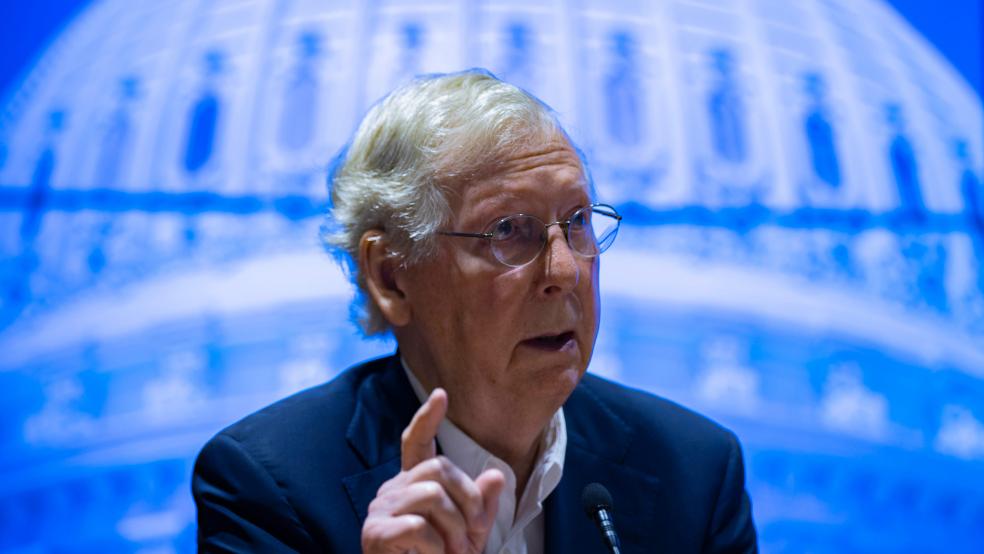The Senate is back in session and lawmakers returning from the August recess are finally ready to jump into action and cement a long-delayed deal on the next coronavirus relief package.
No, of course not. Congress is picking up right where it left off, which is to say Republicans and Democrats are still smack in the middle of their month-long standoff on a coronavirus bill, maneuvering to score political points and cast blame with little prospect for an agreement anytime soon.
What’s new: Senate Majority Leader Mitch McConnell (R-KY) announced Tuesday that he plans to hold a vote this week on a slimmed-down relief bill that would cost upwards of $500 billion, well shy of the $1 trillion plan McConnell released in July.
The package would provide $300 a week in supplemental unemployment benefits through the end of the year, $258 billion in funding for small businesses, $105 billion for education, $47 billion for vaccines and testing, $10 billion for child care and $10 billion for the U.S. Postal Service. It would also provide liability protection for businesses and health care providers and reportedly includes divisive “school choice” language. It does not include another round of $1,200 stimulus checks to individuals or aid to state and local governments.
"It does not contain every idea our party likes," McConnell said in a statement. "I am confident Democrats will feel the same. Yet Republicans believe the many serious differences between our two parties should not stand in the way of agreeing where we can agree and making law that helps our nation."
The package also includes at least $350 billion in offsets, according to a summary cited by Roll Call in order to draw more support from fiscal conservatives.
Still going nowhere: “The legislation is not expected to advance, since that would require support from Democrats, who’ve held out for a larger package,” The Washington Post reports. “McConnell has struggled even to unite Republicans behind the bill, and is likely to suffer some GOP defections.”
Politico reports that Senate Republican leaders are trying to find a path to get 51 votes, but it’s not yet clear they’ll be able to reach even that threshold. “The inability to get 51 GOP votes would be a big defeat for the White House and Senate GOP leadership,” Politico’s Jake Sherman and Anna Palmer write.
What it means: The move is an attempt to ratchet up pressure on House Speaker Nancy Pelosi (D-CA) and Senate Minority Leader Chuck Schumer (D-NY). “Senate Republicans and administration officials believe Pelosi will come under growing pressure from moderate members of her own caucus who face tough reelections and have been uneasy about the failure to act on additional economic stimulus,” the Post reports. “McConnell’s new legislation is partly an attempt to attract the attention of such lawmakers.”
Pelosi and Schumer quickly dismissed the GOP plan. “Senate Republicans appear dead-set on another bill which doesn’t come close to addressing the problems and is headed nowhere,” they said in a joint statement, adding, “this emaciated bill is only intended to help vulnerable Republican Senators by giving them a ‘check the box’ vote to maintain the appearance that they’re not held hostage by their extreme right-wing that doesn’t want to spend a nickel to help people.”
A bit of good news: One possible bright spot in the bipartisan stalemate is that Pelosi and Treasury Secretary Steven Mnuchin have tentatively agreed to a “continuing resolution” to fund the government and avoid a shutdown at the beginning of next month.
The bottom line: With only a few weeks to go before lawmakers leave town again for the final stretch of campaigning, a deal still appears unlikely.
Vice President Mike Pence told CNBC on Friday that nobody wants another round of direct payments more than Trump, and Politico reports that the White House is set to take “baby steps” toward an agreement this week by embracing a $1.5 trillion price tag. But the overall price of a bill and the issue of state and local aid remain significant obstacles. Any GOP urgency to reach a bipartisan deal has also been diminished by last week’s employment report showing the economy added 1.37 million jobs in August and the unemployment rate fell to 8.4% — still high but down enough for the White House to continue to tout what it says is a strong recovery.
White House economic adviser Larry Kudlow on Friday told Bloomberg TV that, while a targeted relief package would be helpful, the country would be fine without an additional coronavirus relief bill. “We can absolutely live with it,” he said.





